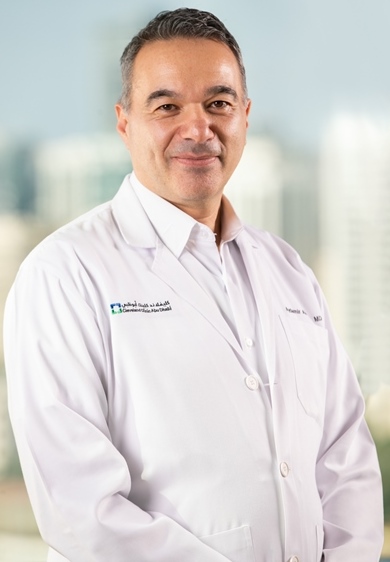Obesity and a diet high in processed meats and low in fiber, coupled with a sedentary lifestyle is likely contributing to increased frequency of colon cancer at a younger age, according to experts at Cleveland Clinic Abu Dhabi.
Colorectal cancer comprises malignant tumors arising from the inner wall of the large intestine or rectum. Globally, the disease, which is often diagnosed in an older population, is increasingly affecting the younger generation as risk factors of obesity continue to rise.
The issue is more pronounced in the United Arab Emirates with colon cancer affecting people 15 years earlier than their American counterparts, according to Abu Dhabi’s Department of Health. According to recent data, it is the leading cause of cancer among men and the third-most-common cause of cancer in women. The youngest person in the UAE to be diagnosed with colon cancer was just 16.
 “One of the most important, and modifiable, reasons that is causing colon cancer in younger patients is their poor lifestyle choices,” says Dr. Aydamir Alrakawi, a gastroenterologist and hepatologist at the Digestive Disease Institute at Cleveland Clinic Abu Dhabi. “We see young people eating more processed foods and red meat and reducing their fiber intake, which are known risk factors for colon cancer.”
“One of the most important, and modifiable, reasons that is causing colon cancer in younger patients is their poor lifestyle choices,” says Dr. Aydamir Alrakawi, a gastroenterologist and hepatologist at the Digestive Disease Institute at Cleveland Clinic Abu Dhabi. “We see young people eating more processed foods and red meat and reducing their fiber intake, which are known risk factors for colon cancer.”
The World Health Organization classifies processed meats as a Group 1 carcinogen, which means that there is sufficient evidence that it causes colon cancer.
Dr. Alrakawi advises people to limit the intake of animal fats, while aiming to include between 25 and 35 grams of fiber from cereals, whole grains, and fiber-rich vegetables and fruits daily.
“There is evidence that a well-balanced diet with least two to three hours of medium-intensity exercise, walking or sports per week may contribute to reducing colon cancer growth and improve patient outcomes.”
Along with altering lifestyle habits, Dr. Alrakawi says it is crucial for at-risk patients to prioritize regular screenings to prevent and fight colon cancer.
New recommendations from the American Cancer Society suggest that people with average risk of colon cancer start regular screening at the age of 45 instead of the initial prescribed age of 50. However, health authorities in the UAE recommend people start getting screened for colon cancer from the age of 40.
This advice is for those who do not have a family history of colon cancer, and who have no symptoms. Screening should commence 10 years earlier if there is a family history of the disease or if they face other risk factors.
“Colon cancer does not produce any explicit symptoms until it may have reached an advanced stage. People need to understand that it is curable and even preventable if detected early through regular screenings. It helps us detect polyps – abnormal tissue growths – which can be treated before they develop into cancer.”
A global youth survey by the Colorectal Cancer Alliance found that the most common symptoms of young onset of the cancer were constipation, blood in stool, bloating, rectal bleeding and diarrhea, with many ignoring them for at least six months before visiting a doctor.
A nationwide survey by Cleveland Clinic Abu Dhabi conducted in 2018 found that fear of potential pain and testing positive for the disease, embarrassment and social stigma prevented respondents from getting a colonoscopy.
“This is telling because it shows a need to bolster efforts in reassuring the public that we have come a long way in screening and innovative treatments that are quick, painless and discreet. Patients now have access to more aggressive and minimally invasive surgeries, better chemotherapy and the ability to recovery faster,” says Dr. Alrakawi.
Cleveland Clinic Abu Dhabi’s Digestive Disease Institute provides gastrointestinal care for patients. It offers a number of advanced procedures including minimally invasive and robotic bariatric, hernia, gastrointestinal and colorectal surgeries, as well as cutting-edge endoscopic procedures for tumor resection and the treatment of achalasia and pancreatic and biliary diseases.The hospital is one of the Department of Health-approved providers for colorectal cancer screening. To arrange a screening at Cleveland Clinic Abu Dhabi, call 800 8 CCAD (800 8 2223).
Let us help you book an appointment at Cleveland Clinic Abu Dhabi.